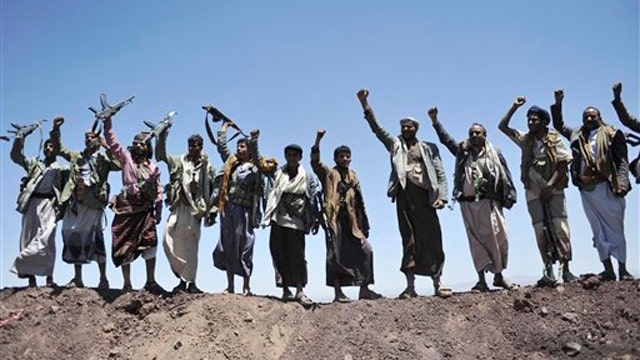The White House insisted Monday that the U.S. counterterrorism strategy in Yemen is a model for the fight against the Islamic State -- despite the country being engulfed by a violent political crisis that last week led the Obama administration to remove some of its diplomats and urge American citizens to leave.
The developments -- including the firing of a rocket near the U.S. Embassy in the country's capital over the weekend -- again have raised questions about President Obama's plan for targeting Islamic State militants in Iraq and Syria.
The White House, though, is standing by claims that the country is a "useful model" for dealing with militants elsewhere. Press Secretary Josh Earnest on Monday claimed fighters in Yemen remain under "continual pressure" from the U.S. despite the latest unrest.
"That threat has been mitigated through the use of this counterterrorism strategy," Earnest said.
In Yemen, the Obama administration, while working with the local government, for years has used drone strikes to target militants with Al Qaeda in the Arabian Peninsula, which is based in the country.
The security situation, though, has dramatically eroded in recent weeks as Shiite rebels overran much of the capital.
On Saturday, the rebels, known as Hawthis, signed a deal as part of a comprehensive agreement brokered by the United Nations. The pact stipulates disarmament and withdrawal from areas they have seized in recent months.
Their political rivals, the Muslim Brotherhood-linked Islah party, and other parties signed as well.
It remains to be seen whether the Hawthis will abide by the terms. They are the strongest force on the ground in the capital Sanaa, where they have deployed thousands of fighters, set up checkpoints and seized weapons from army barracks.
Even as Hawthis were signing the security deal, their fighters clashed with security guards for nearly an hour in front of the house of the national security chief Ali al-Ahmadi. Al-Ahmadi is in charge of a key security apparatus that coordinates joint U.S-Yemeni efforts to combat the country's Al Qaeda franchise.
Elsewhere in the capital, an attacker on Saturday fired a missile near the U.S. Embassy, a Yemeni diplomat confirmed to Fox News. No U.S. personnel or embassy buildings were hit, though a nearby truck with Yemeni special security forces was struck.
The diplomat attributed the attack to Al Qaeda in the Arabian Peninsula; AQAP-affiliated fighters also reportedly claimed responsibility on social media.
A State Department aide acknowledged the attack but said there was "no indication" the U.S. Embassy was targeted.
The department meanwhile said that in light of violence against the Yemeni government, the United States is "stepping up efforts" to pursue sanctions against the perpetrators.
Even before that incident, the State Department already had issued an alert warning U.S. citizens of the "high security threat level" in the country -- and urged those in Yemen to leave.
The alert, issued last Thursday, also confirmed that the department had ordered a "reduction of U.S. government personnel from Yemen out of an abundance of caution due to the continued civil unrest."
The alert described the threat level in Yemen as "extremely high."
The developments come after Obama cited U.S. operations in Yemen and Somalia as a model for going after ISIS.
"This strategy of taking out terrorists who threaten us, while supporting partners on the front lines, is one that we have successfully pursued in Yemen and Somalia for years," the president said on Sept. 10.
Republican critics immediately questioned those remarks, challenging the notion that operations in Yemen and Somalia have been successful.
"These countries are still extremely unstable," Sen. Marco Rubio, R-Fla., told Fox News earlier this month.
Obama's top advisers, though, repeatedly have cited Yemen and Somalia over the past week in describing how the administration is approaching the Islamic State fight in Iraq and Syria.
On Friday, Earnest touted the "effective deployment of a counterterrorism strategy that involves building up the capacity of local forces on occasion backed by American military forces, to counter extremist threats that are emanating from that country."
He said the strategy, despite the U.S. security alert put out last week, has "prevented those extremist groups from being able to plot and plan and carry out successfully attacks against the U.S. homeland."
He added: "I don't want to signal to you that this is a mission that has been accomplished, but it has been a strategy effectively implemented in a way that has mitigated the threat from extremist organizations that are dangerous, and that seek to do harm to the United States."
The Yemeni government has struggled to counter the threat posed by the Hawthi rebels and the Al Qaeda affiliate, while also confronting an increasingly assertive separatist movement in the south. The Hawthis have meanwhile vowed to go after Al Qaeda, calling it an obstacle to state-building efforts.
The new agreement would grant the Hawthis some executive power as it stipulates that the president name two advisers, one from the Hawthis and one from the southern separatist movement.
The deal also calls for the formation of a new government within a month. But the Hawthis and their rivals have thus far failed to agree on a new prime minister.
The Associated Press contributed to this report.













































